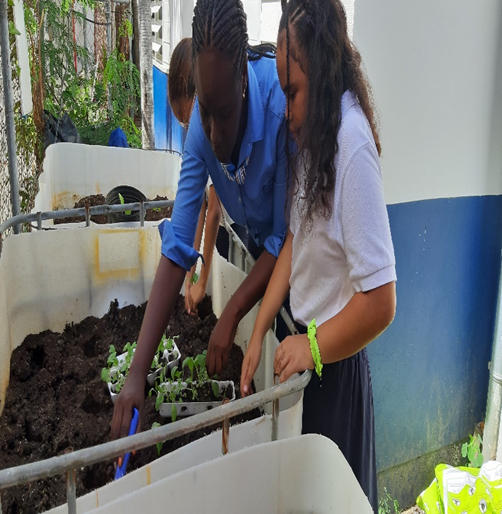By Ria Uiterloo
In my series ‘Why focus on homework and not promote play?’ I promised to write on the 21st Century skills in part 3 of the final article on this subject.
I came across this wonderful article on SEL, which stands for social and emotional learning. It is the process through which students acquire and effectively apply the knowledge, attitudes, and skills necessary to understand and manage emotions, set and achieve positive goals, feel and show empathy for others, establish and maintain positive relationships, and make responsible decisions (CASEL [1]).
The Collaborative for Academic, Social, and Emotional Learning is helping make evidence-based social and emotional learning an integral part of education from preschool through high school.
In this article, I would like to focus on the SEL and CASEL as necessary skills for the 21st Century. Catholic schools on St. Maarten teach those skills through some evidenced based Skill for Life programs from Partnerships for Children [2]. They are essential to be able to succeed as human beings at school and participate as active citizens in society.
A few years ago, I invited a friend Wilma van Esch, an Ecological Pedagogue to facilitate workshops for teachers and youth leaders on the developmental domains of children. She visited with her partner Bart Coppes who facilitated sessions with teachers on Inquiry based learning and learning by design. Teachers were acquainted or reacquainted with the principle of context-rich and Project-based learning (PBL). According to Bart Coppes, we as educators must prepare future generations for an ever-changing world. To do so, we must help them to develop qualities that will enable them to respond to these continuous changes. The basis for this is to have an interest in the world around them and the will to understand it. In order to be able to make well-informed choices, it is important that they are able to take note of the available information about the scientific and technological developments around them. Because they themselves are responsible for these choices, it is also necessary that they are able to treat this information skeptically. To this end, they can ask themselves critical questions about claims made by others about science and technology. Bart further states that the ability to make well-informed decisions about their environment and their own health and well-being can be strengthened by the development of investigative skills. Mr. Coppes also shared that teachers can sow the seeds for pupils to develop an essential scientific attitude (curiosity, creativity, research) and a technical attitude (inventing, designing, making and trying). In order for the children to really learn, we will have to let them explore, discover, research and design. The products they design do not have to be beautiful. As long as they have resulted in a great learning process. As a teacher, you motivate, stimulate and direct that process. You bend questions, provide information and observe in order to be able to make an intervention at the right moment. In short, let children investigate how they can make a self-built car as quickly as possible. Let them actually measure how fast their car is, which gives them a grip on scientific concepts. As example Bart, states “Let children ask themselves what made that car faster and how much faster that is. In the end, let them draw conclusions about their findings themselves (or in groups). These conclusions will be the learning result. That is knowledge that remains, while the car that is made ends up in the garbage bin after some time! With this example of Bart Coppes, todays learning targets, should be geared towards Inquiry based skills that guide student learning and preparing children for life instead of memorizing facts and retaining information.
According to SEL, schools and educators need to tap into students’ personalities to find hidden strengths, understand their emotional intelligence, and use their assets to peak performance. Bringing forth and supporting students’ social-emotional strengths is critical to success in and out of the classroom. Project-based learning is a great method for supporting students’ emotional skills. Project based learning offers well-structured opportunities to learn decision-making, collaboration, and critical thinking skills that result in deeper learning. Project-based Learning is the approach required in FBE (Foundation Based Education).
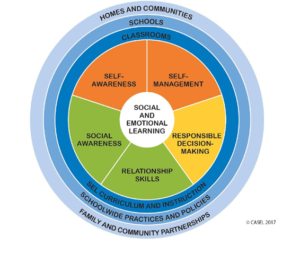
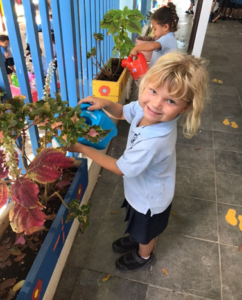
Children of the Sr. Regina School at work during an Agriculture lesson.
21st century skills are a hallmark of PBL. Authentic learning experiences nurture skills students need to live and work in a connected and diverse society. SEL embodies the 4 C’s of 21st century learning. It is worth the effort to integrate opportunities where students refine their social and emotional skills.
1. Critical thinking is about making responsible decisions.
2. Communication requires a social awareness.
3. Collaboration relies on positive relationships.
4. Creativity occurs when one is aware of their strengths.
Project based learning also provides students with a joyful experience—one that stands out among other instructional activities. The many components of PBL combined are what give students motivation for learning and a sense of satisfaction when their work is complete.
According to Sam Northern, a National Board-Certified Teacher-Librarian in small-town Kentucky, embracing students’ personal strengths and fostering social-emotional skills comes naturally during PBL. With PBL, learners explore an engaging topic or respond to an authentic challenge. Students have a voice in the topics they care about. Students use a variety of sources to acquire new knowledge and make cross-curricular connections. Often these sources are peers and mentors. Technology plays an important role, providing learners with information and creative possibilities. Through research and collaboration, students develop solutions and design products that fulfill learning goals. These learning goals extend far beyond content standards.
This is exactly one of the principles of Foundation based education or Experienced based learning.
When a focus is placed on SEL, you will find that students breed a sense of empowerment. They become empowered to take charge of their own learning. Authentic learning experiences encourage students to take on the next phase of their academic and personal lives. By prioritizing social and emotional skills before, during, and after each lesson, you are setting your students up for success.
I would like to stress that Learning through play helps children acquire social and emotional skills. Play provides great learning opportunities for children and young people to develop social and emotional capabilities and to learn subject knowledge. Learning through play takes different forms at different education levels (project-based learning, role-play). Learning through play cuts across disciplines and can be used to learn core subjects like mathematics, languages and science.
Through play, children see different perspectives.
As educators and parents as well as other stakeholders in Education, we have to change our approach to learning and thus our approach to homework in the early years of primary education and education in general. Children are very curious at an early age.
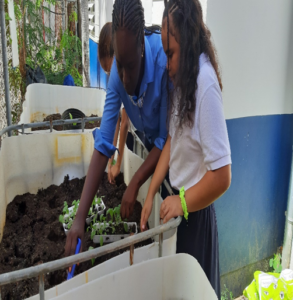
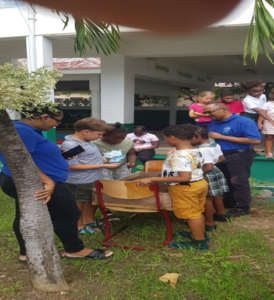
Curiosity during an agriculture activity at the Sr. Magda and Sr. Borgia Schools
Helping children to learn the 21st century skills will only complement the focus on academic learning. Schools and parents should pay attention to the social and emotional development, which will enable children to build character that is essential for individual success and social functioning.
By overburdening children with homework and excess tutoring instead of essential skills to succeed at school and in their future is not beneficial. SEL skills go beyond cognitive development and academic outcomes. They are important drivers of mental health.
Resources:
https://www.misterlibrarian.com/2018/06/pbl-great-place-for-sel.html
https://oecdedutoday.com/new-approach-social-emotional-skills/
https://www.partnershipforchildren.org.uk/
[1] https://casel.org/
[2] https://www.partnershipforchildren.org.uk/


